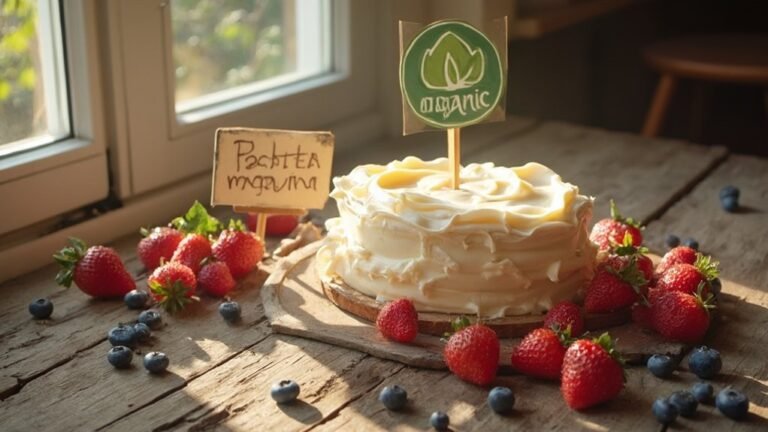The Ultimate Guide to Organic Cakes
If you're keen to dive into the world of organic cakes, you'll find they're crafted from natural ingredients that boost both nutrition and flavour. These cakes are free from synthetic pesticides, which means better health and fewer allergens. Additionally, opting for organic supports sustainable farming practices that are beneficial for our planet. With key ingredients like organic flours and natural sweeteners, as well as a range of enticing flavours, organic cakes can truly enhance your baking experience. There's plenty more to explore!
Key Takeaways
- Organic cakes are crafted from ingredients that are free from synthetic pesticides and fertilisers, which boosts both nutrition and flavour.
- To be certified organic in the UK, products must undergo a thorough plan, inspection, and adhere to strict organic standards.
- Sustainable farming practices in organic baking support soil health, encourage biodiversity, and help to lessen environmental impact.
- Essential organic ingredients include whole grains, natural sweeteners, and dairy-free alternatives, catering to various dietary requirements.
- The future of the organic cake market is leaning towards health-conscious choices, innovative flavours, and clear label transparency.
Understanding Organic Ingredients
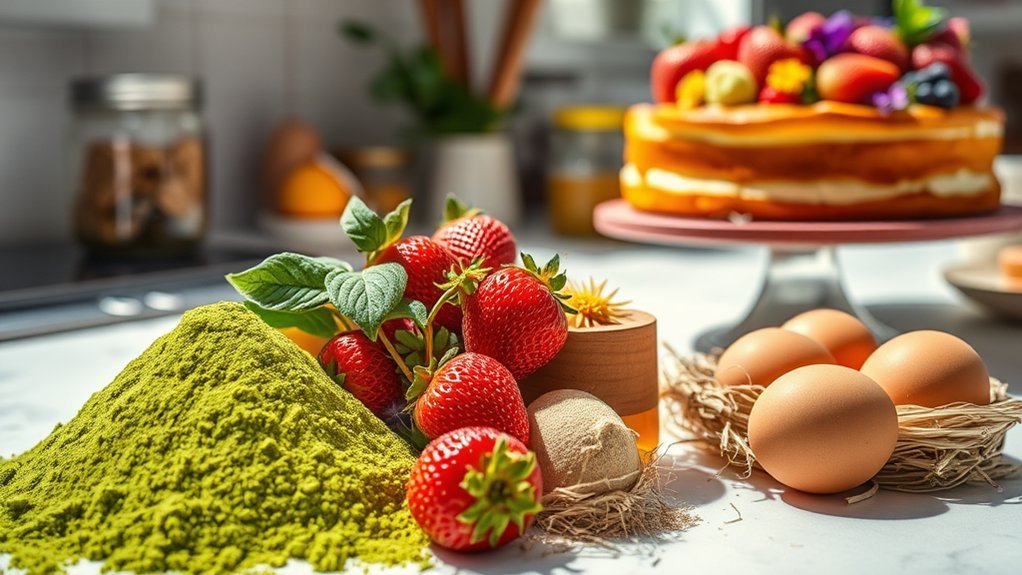
When baking, understanding organic ingredients is crucial for making tasty and health-conscious cakes. These ingredients, derived from plants or animals, adhere to strict UK organic standards, ensuring they're free from chemical residues and artificial additives. By choosing organic flour, eggs, sugars, or dairy, you opt for products made without synthetic hormones or antibiotics. Additionally, using organic ingredients ensures a healthier first taste for your baby's cake, promoting better nutrition right from the start. Look for clear organic labels to ensure authenticity—this transparency builds trust in your baking. Using organic ingredients not only boosts the nutrition and flavour of your cakes but also supports sustainable farming practices that benefit the environment and animal welfare. Embrace organic for a healthier baking experience!
The Certification Process for Organic Products
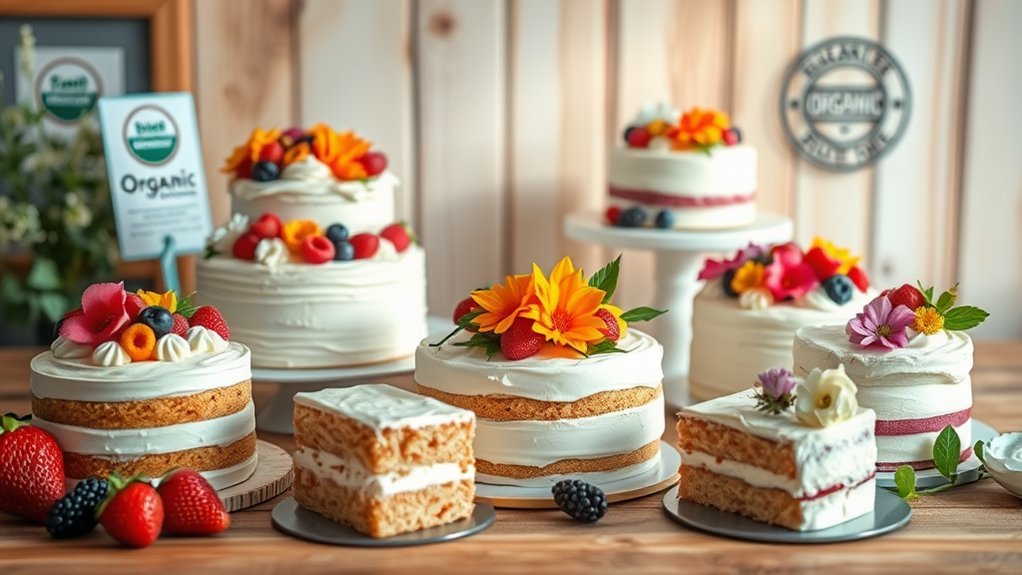
To navigate the certification process for organic products in the UK, it's essential to grasp the key steps and requirements.
Begin by creating an organic system plan that details your practices and materials. After implementing this plan, you'll need to undergo an inspection by a certifying agent accredited by the Soil Association or another recognised body, who'll assess your compliance with organic standards. Be aware that certification comes with costs, such as application fees, inspection fees, and annual renewal fees. It's crucial to maintain thorough records to track your practices accurately.
Following the inspection, you'll receive a report that evaluates your compliance and determines whether you achieve organic certification. This certification not only enhances your marketability but also assures consumers of your dedication to organic practices. Additionally, it's important to remember that land must be free of all prohibited substances for at least 3 years before certification.
Nutritional Benefits of Organic Cakes

Organic cakes not only delight your palate but also provide numerous nutritional benefits, making them a healthier option. Crafted from ingredients free of synthetic pesticides and fertilisers, these cakes typically have a higher nutrient content. Whole grains and natural sweeteners can help regulate blood sugar levels, while inclusions like fruits and nuts are rich in essential vitamins and antioxidants. Additionally, choosing vegan cakes promotes a sustainable lifestyle by reducing reliance on animal products. Enjoy benefits such as improved digestion and lower levels of unhealthy fats that support heart health. Additionally, organic cakes often contain fewer allergens, making them suitable for those with dietary sensitivities.
The Environmental Impact of Organic Baking
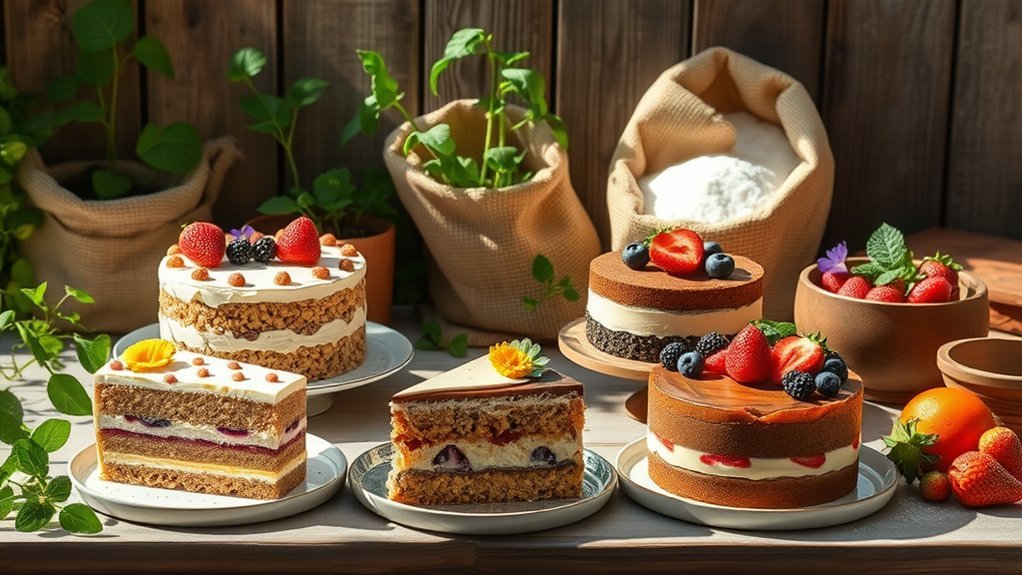
Choosing organic baking supports sustainable farming that benefits both the environment and local communities.
By using fewer chemicals, you're not only baking tasty treats but also helping to keep harmful pollutants out of our ecosystem.
This approach allows you to make a positive difference, one cake at a time.
Sustainable Farming Practices
Sustainable farming practices are vital for the environmental impact of organic baking, changing our approach to food production. By prioritising soil health, these practices improve soil structure and fertility, allowing crops to flourish without synthetic fertilisers.
For example, crop rotation helps prevent erosion and enhances nutrient availability, promoting resilient ecosystems.
Organic farming also boosts biodiversity by encouraging diverse crop growth, creating habitats that support wildlife.
Water conservation methods, such as efficient irrigation and rainwater harvesting, reduce waste and increase drought resilience.
Ultimately, adopting these sustainable practices not only benefits the planet but also ensures that your organic cakes are made from ingredients that are kind to both you and the Earth.
Reduced Chemical Usage
By choosing organic baking, you're not just indulging your taste buds; you're also making a significant statement about your commitment to the environment.
Reduced chemical usage in organic baking offers numerous health benefits and supports sustainable practices. Here's how:
- Minimised pesticide use: You cut down on harmful chemicals, contributing to a cleaner ecosystem.
- Soil health preservation: Organic methods boost soil fertility and promote biodiversity.
- Less water pollution: Your choices help protect aquatic ecosystems from chemical runoff.
- Ecosystem support: By opting for organic ingredients, you encourage natural pest control.
This commitment promotes awareness about the importance of sustainability and healthier choices, making a positive impact on both your community and the planet.
Embrace organic baking and see your influence grow!
Key Ingredients Used in Organic Cakes
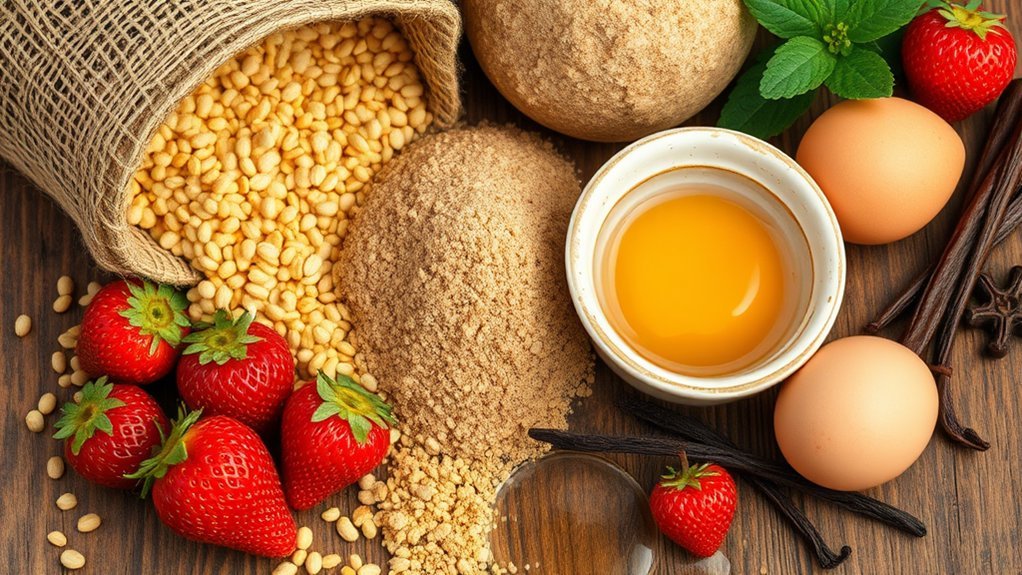
When baking organic cakes, selecting the right flour and sweetener is crucial.
Organic plain flour is versatile, while almond flour is a great gluten-free option.
Combine these with natural sweeteners like organic cane sugar or monk fruit sugar, and you'll whip up a delicious, wholesome treat that everyone can savour.
Organic Flour Types
Choosing the right type of organic flour is crucial for baking delightful cakes. Each flour type offers distinct qualities that can enhance your baking. Here are four popular choices:
- Organic All-Purpose Flour: Very versatile, suitable for a variety of baked goods.
- Organic Whole Wheat Flour: Rich in fibre and nutrients, providing a hearty texture.
- Organic Cake Flour: Low in protein, perfect for creating soft, delicate cakes.
- Organic Spelt Flour: Offers a nutty flavour and is easier for some to digest.
When using organic flour, be aware that gluten levels can influence your cake's texture, so adjust your mixing method as needed.
Proper storage of flour is vital to keep it fresh and maintain quality, ensuring your cake is consistently delicious!
Natural Sweeteners Options
Have you ever thought about how natural sweeteners can enhance your organic cakes? Different types of natural sweeteners offer unique flavours and health benefits.
For example, organic maple syrup adds a rich, earthy sweetness and is full of antioxidants. Monk fruit sweetener is a zero-calorie choice that won't affect your blood sugar levels. Coconut sugar has a lower glycemic index and provides a delicious caramel-like flavour.
You might also consider using organic applesauce or dates for added moisture and sweetness. Each sweetener offers its own distinct taste, allowing you to personalise your cakes for a delightful, guilt-free treat.
Embrace these natural options for scrumptious, healthier desserts!
Consumer Preferences and Trends

What influences today's consumer preferences for organic cakes? As you explore market trends, you'll notice a clear shift towards healthier choices. Here are the key factors driving your decisions:
- Health Concerns: Many of you prefer organic and non-GMO cakes, steering clear of synthetic chemicals and artificial ingredients.
- Environmental Awareness: Organic products align with your values, supporting sustainability and environmental health.
- Transparency: You look for brands that prioritise clear labels, avoiding toxic additives for a safer option for your family.
- Convenience: With busy lifestyles, you value the accessibility of organic cakes in supermarkets and online, allowing you to indulge without guilt.
These factors shape your preferences and highlight the increasing demand for organic cakes in the UK market.
Organic Cake Production Methods
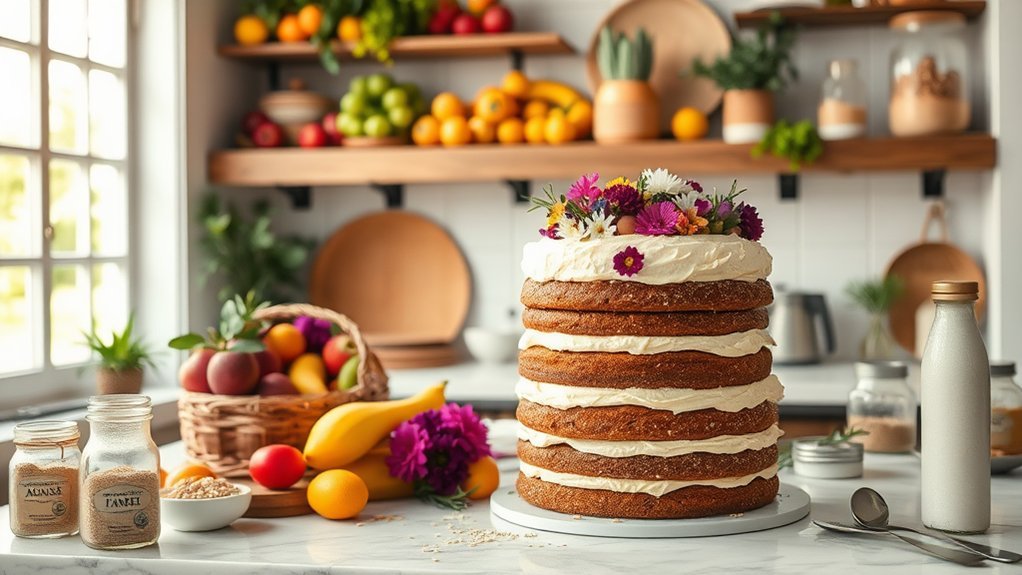
Choosing organic cakes means enjoying delightful flavours while supporting GMO-free ingredients and sustainable farming.
These practices ensure your cake is made with high-quality, ethical components that are gentle on both your body and the environment.
Let's take a look at how these methods influence organic baking, resulting in treats that are both wholesome and delicious.
GMO-Free Ingredients Overview
As you delve into organic cake production, you'll find that using GMO-free ingredients is crucial for crafting tasty and health-conscious treats.
Choosing GMO-free not only elevates flavour but also brings a host of benefits. Here's a brief overview of essential ingredients:
- Organic Eggs – They offer better nutrition and enhance taste.
- Organic Cane Sugar – A less processed, natural sweetener.
- Dairy-Free Alternatives – Options like organic oat or coconut milk cater to different dietary needs.
- Organic Flours – Gluten-free choices, such as almond or rice flour, ensure everyone can enjoy your cakes.
Sustainable Farming Practices
Adopting sustainable farming practices in organic cake production improves ingredient quality and benefits the environment. Techniques like crop rotation enhance soil health and promote biodiversity, supporting a robust ecosystem.
| Sustainable Practice | Benefits |
|---|---|
| Crop Rotation | Enhances soil fertility |
| Local Sourcing | Supports local economies |
| Reduced Chemical Use | Safeguards local wildlife |
Using fresh, seasonal produce from local farms ensures your cakes are both delicious and eco-friendly. This not only improves your baking but also strengthens community ties, making your organic creations even more impactful.
Effective Marketing Strategies for Organic Cakes
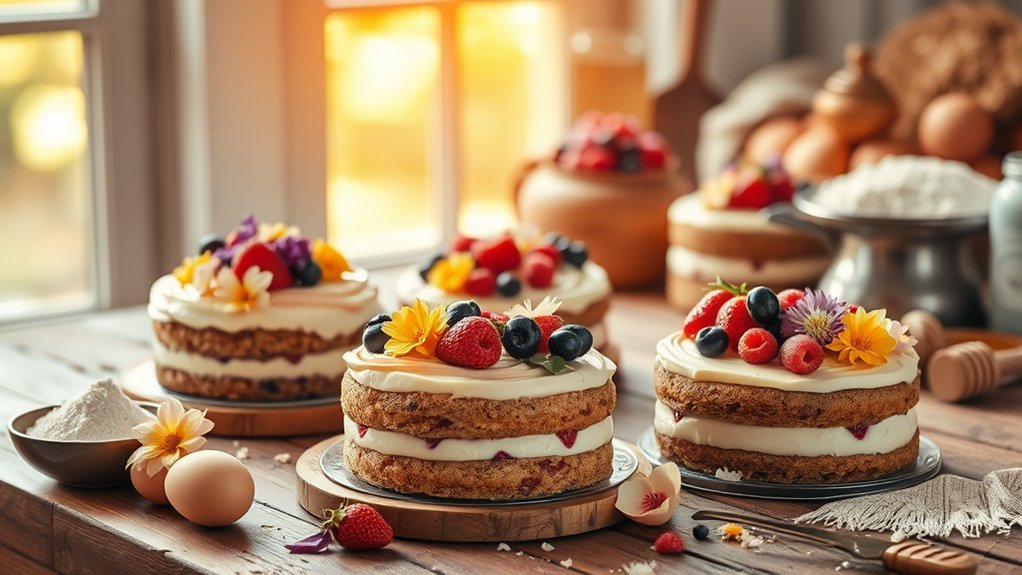
How can you effectively market organic cakes in a competitive UK market? Here are four straightforward strategies to connect with health-conscious consumers:
- Identify Your Audience: Understand who your customers are. Segment your market into groups like busy parents looking for healthier treats and fitness enthusiasts seeking nutritious options.
- Create a Unique Selling Proposition: Emphasise the health benefits, ethical sourcing, and artisanal craftsmanship of your cakes. For instance, highlight that your ingredients are locally sourced and free from artificial additives.
- Leverage Online Presence: Utilise social media platforms like Instagram to share mouth-watering images of your cakes. Ensure your website is user-friendly with e-commerce options for easy ordering.
- Engage with Your Community: Get involved in local events, offer free tastings, and collaborate with nearby businesses to boost your visibility and build a strong brand reputation.
Future Trends in the Organic Cake Market
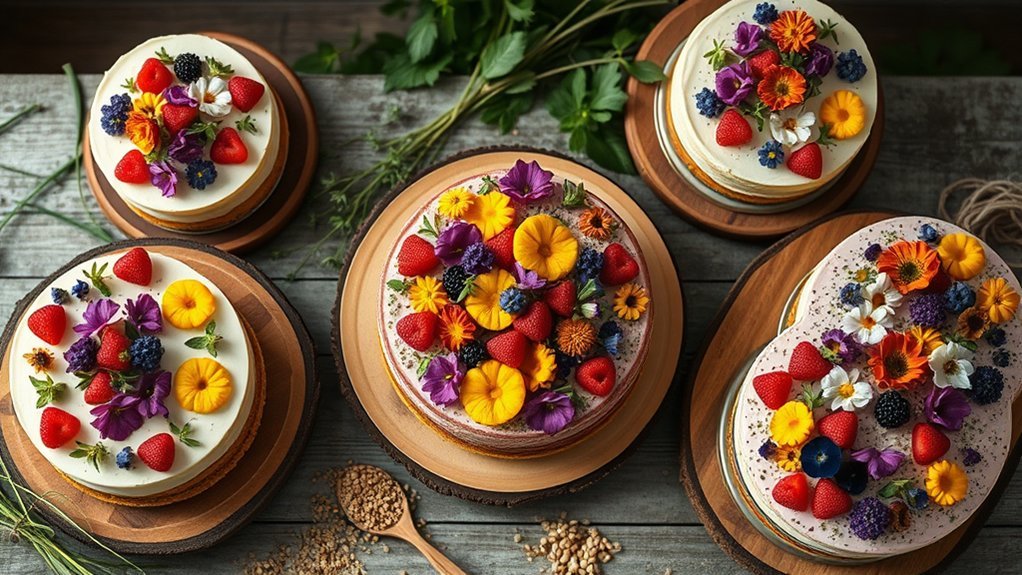
The organic cake market is evolving, driven by exciting new trends. We're seeing a rise in flavour innovations, with brands experimenting to create unique combinations that are sure to please your palate. Health-conscious options like gluten-free, vegan, and low-sugar cakes are now more common, appealing to a broader audience.
However, challenges remain, such as sourcing high-quality organic ingredients and maintaining sustainable practices. There's a growing demand for clean-label products, meaning you can be confident about what goes into your cake.
Moreover, the increase in e-commerce makes it easier to get your hands on these tasty treats, while local sourcing supports environmental responsibility.
Embracing these trends will undoubtedly enhance your experience with organic cakes!
Tips for Baking Your Own Organic Cakes
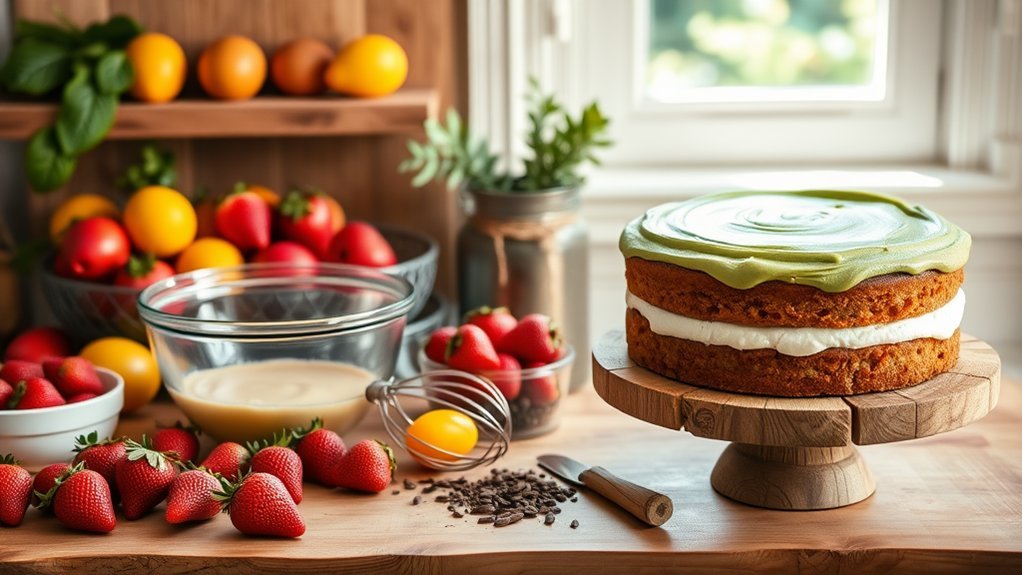
If you're ready to dive into the wonderful world of baking your own organic cakes, selecting the right ingredients is your first crucial step. Here are some straightforward tips to get you started:
- Opt for organic flour for purity and proper absorption.
- Use room temperature ingredients to achieve a smooth mix without overworking the batter.
- Include quality eggs to improve the cake's structure and moisture.
- Try flavour combinations like chocolate and raspberry or lemon and lavender for a delightful twist.
Don't forget to explore different cake decoration techniques to enhance your creation.
By following these tips, you'll bake delicious organic cakes that taste fantastic and show your commitment to sustainability.
Happy baking!
Frequently Asked Questions
Are Organic Cakes Gluten-Free?
About 30% of consumers now look for gluten-free options. While not all organic cakes are gluten-free, many use gluten-free ingredients like almond flour and tapioca starch. This approach caters to those with dietary restrictions.
How Long Do Organic Cakes Last?
Organic cakes usually last for up to five days once opened, depending on how they're stored. For the best results, keep them in airtight containers in a cool, dry place. If you want to extend their freshness, freezing them can keep them good for up to three months, but be aware that this may change the texture.
Can I Freeze Organic Cakes?
Yes, you can freeze organic cakes! Just make sure to use robust organic frosting and wrap them properly to keep their flavour and texture intact for months. For example, if you have a leftover carrot cake, simply slice it, wrap each piece tightly in cling film, and pop it in the freezer.
Are Organic Cakes Suitable for Vegans?
Yes, organic cakes can be suitable for vegans if you use plant-based milk and egg alternatives. For instance, almond milk or oat milk can replace dairy milk, while flaxseed or aquafaba can serve as egg substitutes. With these ingredients, you can create tasty vegan cakes that suit your dietary needs. Enjoy your baking!
Where Can I Buy Organic Cakes?
You can purchase organic cakes at local markets or online bakeries in the UK. Look for gluten-free or vegan options, and take advantage of the ability to customise your order for any occasion or dietary requirement.
Conclusion
Baking an organic cake goes beyond just mixing flour and sugar. It's an opportunity to use sustainable ingredients and ethical practices, all while being mindful of the environment. As you create your next cake, remember that you're not just indulging; you're contributing to a healthier planet with every slice. Who knew that enjoying a treat could also be eco-friendly? Dive into this rewarding experience, and let your taste buds and conscience enjoy the benefits together!


